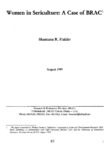| dc.contributor.author | Halder, Shantana R. | |
| dc.date.accessioned | 2019-11-21T10:29:08Z | |
| dc.date.available | 2019-11-21T10:29:08Z | |
| dc.date.issued | 1999-08 | |
| dc.identifier.citation | Halder, S. R. (1999, August). Women in sericulture: a case of BRAC. Research Reports (1999): Economic Studies, Vol - XIV, 93–112. | en_US |
| dc.identifier.uri | http://hdl.handle.net/10361/13068 | |
| dc.description.abstract | BRAC is a Bangladeshi non-government development organization working with mainly the
rural poor women. Its twin objectives are alleviation of poverty and empowerment of women.
The sericulture programme of BRAC as part of BRAC's Employment and Income Generation
(EIG) programme started in 1978 to i) generate income and employment for, the landless poor
women; ii) increase silk production of the ·country; iii) promote afforestation through
mulberry plantation; and iv) to utilize fallow land unsuitable for traditional crops for
productive purposes. Major components of the programme are: a) Nursery; b) Mulberry
plantation; c) Rearing of the silkworms; d) Reeling and e) Weaving. Currently 21,445 BRAC
Village Organization (VO) members are involved in different components of the programme.
This paper presents the findings of a study carried out by the Research and Evaluation
Division of BRAC on 492 programme participants involved in its sericulture programme.
The main objective of the study was to measure the efficiency of the programme from the
participants' as well as the organizer's point of view. Results show that the programme
involved a significant proportion of full time housewives and created for them an employment
opportunity. Cost-benefit analysis of different components of the programme shows that all
of its partic (pants earned accounting profit from the activities they were involved in. The net ·
economic gain was also found positive although the amount was negligible. For BRAC the
cost of the business development services provided to the programme participants was higher
than the amount it received as service charge although there is a declining trend in its service
delivery cost per participant. Considering the study findings some suggestions are made for
sustainable development of the programme and for generating more income for its
programme participants and to reduce the service delivery cost of BRAC. | en_US |
| dc.language.iso | en | en_US |
| dc.publisher | BRAC | en_US |
| dc.subject | Women's employment | en_US |
| dc.subject | Rural poor women | en_US |
| dc.subject | Women's empowerment | en_US |
| dc.subject | BRAC | en_US |
| dc.subject.lcsh | Sericulture--Bangladesh. | |
| dc.subject.lcsh | Women--Employment--Bangladesh. | |
| dc.subject.lcsh | Women in rural development--Bangladesh. | |
| dc.title | Women in sericulture: a case of BRAC | en_US |
| dc.type | Research report | en_US |

